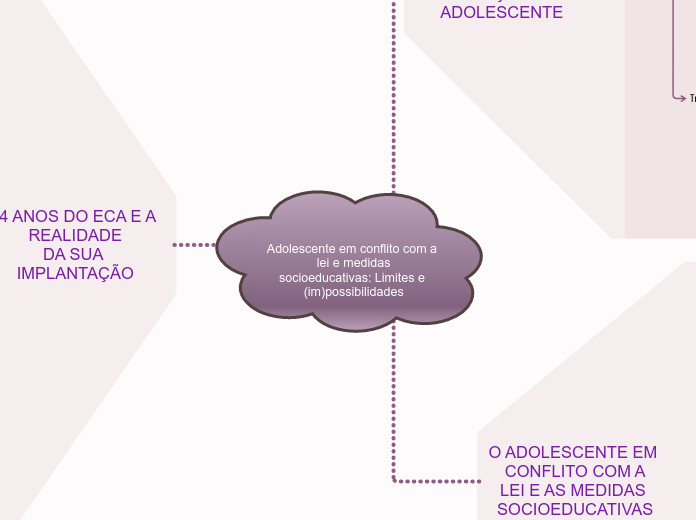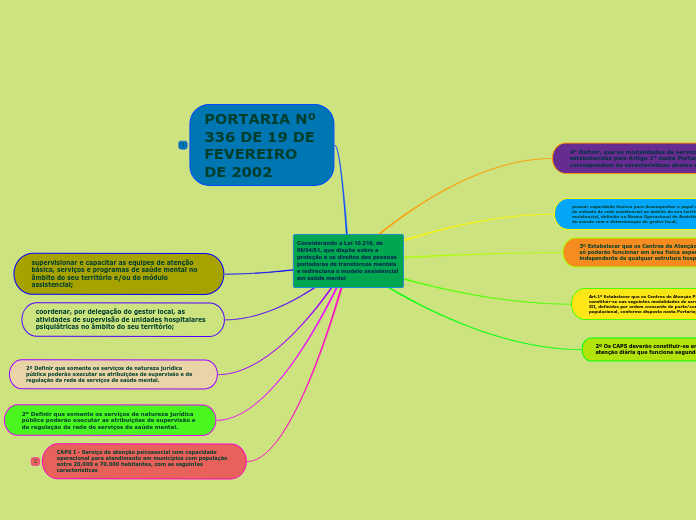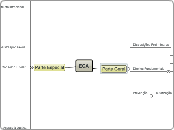Adolescente em conflito com a lei e medidas
socioeducativas: Limites e (im)possibilidades
Tenses demonstrate the time of actions centered around the subject of the sentence. These actions are called verbs and change according to tenses.
14 ANOS DO ECA E A REALIDADE
DA SUA IMPLANTAÇÃO
There are four Future tenses:
- Future Simple ('with Will' and 'with Going to')
- Future Continuous
- Future Perfect Simple
- Future Perfect Continuous
A instituição escolar é reiterativa da precariedade do sistema de cumprimento de medidas e da ausência de um projeto pedagógico amplo para suas unidades. Quando existe uma escola no interior das mesmas, ela funciona precariamente, sem pessoal qualificado, sem vínculo com o sistema formal e sem qualquer tipo de regulamentação. No tocante ao trabalho com pessoas do convívio dos adolescentes, como referido anteriormente, observa-se a quase absoluta falta de estrutura para lidar com as famílias e com outros membros da comunidade de origem, como amigos, vizinhos etc.
Future Perfect Simple is used for:
- an action that will continue up until a point in the future
- an action that finishes just before another time or action in the future
Some adverbs used with Past Perfect Continuous for future actions:
- for
- since
- next week
- next month
- next year
“A instituição pretende ajustar o indivíduo à sociedade, mas acaba produzindo o efeito
contrário, o de reafirmação de sua marginalidade”
(Constantino, 2000, p. 28).
Structure:
Will + Subject + Have Been + Verb-ING
e.g. How long will they be working on that project next week?
É possível observar o progressivo aumento do
número de jovens que reincidem nas suas transgressões, comprometendo cada vez mais as já pequenas
possibilidades de reinserção.
Type in your own examples or you can also choose from the examples below.
Form of word "to be":
Will I have been being?Will you have been being?Will he/she/it have been being?Will we have been being?Will you have been being?Will they have been being?
Form of word "to have":
Will I have been having?Will you have been having?Will he/she/it have been having?Will we have been having?Will you have been having?Will they have been having?
Investigar o caráter educativo das medidas aplicadas ao adolescente infrator requer ter
claro que o ato educativo, de maneira mais ou menos explícita para quem com ele lida.
Future Perfect Simple is used for:
- an action that will be finished by a particular time in the future
- an action that starts before and continues up to another action or time in the future
- an action that will finish before a certain time in the future, but it is not known exactly when
Adverb used with Future Continuous:
- tomorrow (e.g. tomorrow by 7)
O que dá o caráter “educativo” das medidas? Em outras palavras, educar
para o quê, para o exercício de uma profissão, de uma vida em família, de continuidade e/ou (re)integração
ao sistema educativo formal? O que o adolescente que se encontra em conflito com a lei demanda das instituições formadoras?
Structure:
Subject + Will Have + Past Participle
e.g. I will have met my friend form United States by this time tomorrow.
“A prática social com relação à infância continua sendo marcada
por violência, negligência e incompetência na esfera pública?”
Future Continuous is used:
- for an action that is likely to happen in the future and continue for an expected length of time
- for an action that will be in progress at some point in the future
- for action verbs (e.g. running)
- for predictions about future events
Adverb used with Future Continuous:
- tomorrow (e.g. tomorrow at 5 o'clock)
Por que é tão difícil ao
adolescente não reincidir?
Structure:
Subject + Won’t Be + Verb-ING
e.g. He won’t be having fun at the party.
O que existirá por trás da dificuldade dos governos procederem ao reordenamento jurídico-institucional
Structure:
Subject + Will Be + Verb-ING
e.g. You will be having fun at the party.
Interrogações sobre a distância entre o que é preconizado pela lei e o que é efetivamente desenvolvido nessas instituições.
Future Simple is used:
- to predict an event in the future
- to invite
- to give orders
- to express willingness
- for actions that have not yet occurred but that will occur at a future date
Coordenação e conexão
entre serviços e políticas de diferentes ordens
Rotinas
técnicas e administrativas
'Going to' Future is used:
- to talk about our future intentions and plans
- for commands
Some adverbs used with 'Going to' Future:
- later
- tonight
- tomorrow
- next week
- next month
- next year
Alterações na filosofia e
nos programas de trabalho
Future Simple with 'will'' is used:
- to predict the future
- for something with absolute certainty
- when we're talking about a decision at the moment of speaking
- promises, requests, refusals, offers
- future facts
Some adverbs used with Future Simple:
- tomorrow
- next week
- next month
- next year
O ADOLESCENTE EM CONFLITO COM A
LEI E AS MEDIDAS SOCIOEDUCATIVAS
There are four Past tenses:
- Past Simple
- Past Continuous
- Past Perfect Simple
- Past Perfect Continuous
Reconhecimento de que a obediência a regras
mínimas é essencial para o convívio social
Past Continuous is used for:
- an action that happened before another action in the past
- an action that started in the past and continued up to a given time in the past
- an action done several times up to a point in the past and continued to do after that point
- an action that happened in the past but is important at the time of reporting
Some adverbs used with Past Continuous:
- always, only, never, ever, still, just
“o processo de desenvolvimento do adolescente passa pela
aprendizagem de um posicionamento crítico e responsável em relação às suas condutas” (Barbosa, 2002,
p. 10).
Structure:
Was/ were + Verb-ING?
e.g. Were you studying when she called?
Adolescente infrator
Past simple expresses:
- an action that happened in the past and has no connection with the present
- an action that happened once in the past
- an action that happened regularly in the past
- an action that was true for some time in the past
- an event or action that already occurred
- an action that is finite - has both a starting and a stopping point
Some adverbs used with Past Simple:
- yesterday
- last month, last year
- ago (e.g. two days ago)
- in (e.g. in 1997)
- never, always, seldom, often, frequently, occasionally, once, twice
Medidas socioeducativas, cujo objetivo é menos a punição e mais a tentativa de
reinserção social, de fortalecimento dos vínculos familiares e comunitários.
Structure:
Did + subject + Base Form of the Verb?
e.g. Where did you meet her?
Ainda que os adolescentes se encontrem sujeitos a todas as conseqüências dos seus atos infracionais, não são passíveis de responsabilização penal.
Structure:
Subject + did not/didn’t + Base Form of the Verb
e.g. They didn’t like my food.
Entre 12 e 18 anos de idade
São passíveis de cometerem o ato infracional, entendido como a transgressão das normas estabelecidas, do dever jurídico, que em face das peculiaridades que os cercam, não pode se caracterizar enquanto crime.
Structure:
Subject + Verb in Past Simple (2nd form)
e.g. They lived in Spain three years ago.
O ESTATUTO DA CRIANÇA E DO
ADOLESCENTE
There are four Present tenses:
- Present Simple
- Present Continuous
- Present Perfect
- Present Perfect Continuous
ECA
Present Perfect is used for:
- an action that occurred at a time which is indefinite and has its effect on the subject
- an action that occurred many times and has the possibility to occur in the present/future
- an action that began in the past and is still going on in the present
Some adverbs used with Present Perfect:
- just
- already
- yet
- for
- never/ever
- up to now
Transformações legais
Structure:
Have/ has +Subject+ Past Participle?
e.g. Has she finished the letter?
a) Municipalização da política de atenção direta;
b) Eliminação de formas coercitivas de internação,
por motivos relativos ao desamparo social, na
medida em que suprime a figura da situação
irregular. Neste sentido, a privação de liberdade
só é aceita nos casos de flagrante de ato infracional ou por ordem escrita e fundamentada da
autoridade judicial competente;
c) Participação paritária e deliberativa do governo-sociedade civil, assegurada pela existência
de Conselhos de Direitos da Criança e do Adolescente, nos três níveis da organização política
e administrativa do país: federal, estadual e municipal;
d) Hierarquização da função judicial, transferindo
aos conselhos tutelares, de atuação exclusiva no
âmbito municipal, tudo o que for relativo à atenção de casos não vinculados ao âmbito da infração penal, nem a decisões relevantes passíveis
de produzir alterações importantes na condição
jurídica da criança ou do adolescente.
Type in your own examples or you can also choose from the examples below.
Form of word "to be":
Have I been?Have you been?Has he/she/it been?Have we been?Have you been?Have they been?
Form of word "to have":
Have I had?Have you had?Has he/she/it had?Have we had?Have you had?Have they had?
Atribuições do Estado e o papel
da família e da sociedade
Structure:
Subject + haven’t (have not)/ hasn’t (has not) + Past Participle
e.g. She hasn’t finished the letter.
É dever da família, da sociedade e do Estado assegurar à criança e ao adolescente, com absoluta prioridade, o direito à vida, à saúde, à alimentação, à
educação, ao lazer, à profissionalização, à cultura,
à dignidade, ao respeito, à liberdade, à convivência familiar e comunitária, além de deixá-los a salvo de toda forma de negligência, discriminação,
exploração, violência, crueldade e opressão (Brasil, 1990, p. 23).
Type in your own examples or you can also choose from the examples below.
Form of word "to be":
I have not beenYou have not beenHe/She/It has not beenWe have not beenYou have not beenThey have not been
Form of word "to have":
I have not hadYou have not hadHe has not hadWe have not hadYou have not hadThey have not had
Crianças e adolescentes são sujeitos de direitos
Structure:
Subject + have/ has + Past Participle (3rd Form of the Verb)
e.g. She has finished the letter.









